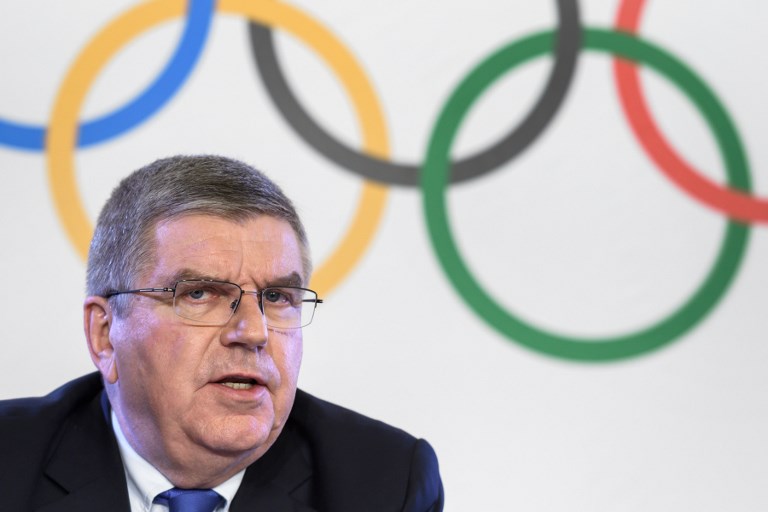Russia banned from 2018 Winter Olympics over doping

International Olympic Committee (IOC) President Thomas Bach attends a press conference following an executive meeting on Russian doping, on December 5, 2017 in Lausanne, Switzerland. Russia were banned from the 2018 Olympics on December 5 over state-sponsored doping but the International Olympic Committee said Russian competitors would be able to compete “under strict conditions”. AFP
LAUSANNE, Switzerland — Russia was banned Tuesday from the 2018 Winter Games by the International Olympic Committee over its state-orchestrated doping program, but clean Russian athletes will be allowed to compete under an Olympic flag.
The sanction was the toughest ever levelled by the IOC for drug cheating and came just 65 days ahead of the Games in Pyeongchang, South Korea.
In announcing the decision, IOC president Thomas Bach accused Russia of “perpetrating an unprecedented attack on the integrity of the Olympic Games and sport”.
An explosive report by the World Anti-doping Agency (WADA) and two subsequent IOC investigations have confirmed that Russian athletes took part in an elaborate drug cheating program which peaked during the 2014 Winter Olympics in Sochi.
Mounting evidence has indicated that the scheme involved senior government officials, including from the sports ministry, with help from secret state agents.
The IOC also banned Russia’s Deputy Prime Minister Vitaly Mutko — who was sports minister during the Sochi Games — for life.
Mutko is currently the head of the organizing committee for the 2018 World Cup, which Russia is hosting.
Attention will quickly turn to see if football’s world governing body FIFA allows the scandal-tainted ally of President Vladimir Putin to retain his senior World Cup role.
In a statement, FIFA said it had “taken note” of the IOC decision but it had “no impact on the preparations” for Russia 2018.
Russia ‘apologized’
The IOC also suspended the Russian Olympic Committee (ROC) and its chief Alexander Zhukov.
Zhukov said he “apologized” to the IOC on Tuesday for the “anti-doping violations” committed in his country in recent years.
The IOC had the option of hitting Russia with a blanket ban, the so-called nuclear option that was applied to apartheid-era South Africa from 1964 to 1988.
The IOC’s decision to choose a more moderate path offers some Russian athletes a route to competing in the Games — although that will be by invitation only and dependent on a stringent testing program.
“The IOC, at its absolute discretion, will ultimately determine the athletes to be invited from the list,” the IOC said in a statement.
No Russian athlete with a previous doping violation will be allowed to compete and no official who had a leadership role at Sochi 2014 will be invited to Pyeongchang.
Those athletes who do go to the Games will participate under the name “Olympic Athlete from Russia” and the country’s flag will not fly at any 2018 ceremony, the IOC also said.
The Games’ South Korean organizers said they would welcome the Russian athletes to compete under a neutral flag.
“We accept and respect the decisions of the IOC Executive Board that Russia may compete under a neutral flag,” the Pyeongchang organizing committee said in a statement Wednesday.
“We will work with the IOC and all other relevant stakeholders accordingly to ensure that all the athletes and officials attending the Games as part of this team are given the best experience possible.”
‘Principled decision’
The US Olympic Committee praised the IOC’s “strong and principled decision.
“There were no perfect options, but this decision will clearly make it less likely that this ever happens again,” it said.
For Grigory Rodchenkov, the former Russian laboratory chief and whistleblower who lifted the lid on the cheating scheme, the IOC’s action was a needed step to clean up the Olympic movement.
“It was the most elaborate and sophisticated doping system in the history of sports. If it did not carry the most significant sanction it would simply have emboldened Russia and other countries who don’t respect the rules”, Rodchenkov’s lawyer, Jim Walden, told reporters on a conference call.
Boycott?
Russian officials have previously met doping accusations with defiance.
Mutko has said the allegations were an attempt “to create an image of an axis of evil” against his country while Putin has warned that a Russia ban would cause “serious harm to the Olympic movement”.
He said forcing Russian athletes to compete under a neutral flag would amount to a national “humiliation”.
That has fuelled speculation that Moscow would instruct its athletes to boycott the compromise solution decided by the IOC.
“An Olympic boycott has never achieved anything,” Bach said, insisting that given the window left open for clean athletes to compete, a boycott was unwarranted.
But the IOC expulsion sparked immediate outrage in Russia.
Deputy speaker of the Russian parliament’s lower house, the State Duma, Pyotr Tolstoy has already called for a boycott.
“They are humiliating the whole of Russia through the absence of its flag and anthem,” he said in televised remarks.
The president of Russia’s Bobsleigh Federation, Alexander Zubkov told Russian TV that the IOC decision was a “humiliation.”
“This is a punch in the stomach”, he said. /cbb